Lisbon, Portugal – The olive-green army automobiles are the identical, as are the uniforms of the personnel driving them. It’s even the identical day of the week on this April 25 – a Thursday.
That is when it began, on the shore of the Tagus River the place the solar hangs like a bulb over the Portuguese capital and Europe’s westernmost edge.
However the cheering crowds beside the highway immediately, waving crimson carnations purchased from flower women on Rossio Sq. weren’t there 50 years in the past. No one clapped their arms or posted pictures on social media together with catchy hashtags.
On that brisk daybreak, the streets had been abandoned whereas Lisbon nonetheless slumbered, whereas a revolt was taking beginning. That morning, Portugal was nonetheless a fascist dictatorship that had fought three brutal wars in Portuguese Guinea, Angola, and Mozambique in its determined bid to maintain management over its African colonies. By the tip of the day, Portugal’s 42-year-old dictatorship, Estado Novo (“New State”), had been felled by a swift army takeover.
“We had been skilled troopers, we’d been in wars and had been skilled to take care of tense conditions, however this was one thing utterly completely different,” says former navy captain Carlos Almada Contreiras.
Contreiras was among the many 163 army captains who in September 1973 had come collectively in secret at a “particular farmhouse barbeque” to type the clandestine “Motion of Armed Forces” (Movimento das Forcas Armadas, MFA). These had been males who had fought the Portuguese dictatorship’s colonial wars and knew very effectively that no army victory was shut at hand; quite the opposite, morale was in decline and an estimated 9,000 Portuguese troopers had died since 1961.

On April 25, 1974, they turned their gaze in the direction of Lisbon’s political coronary heart, aspiring to seize management of key army installations, political chambers and broadcasting services, in addition to the airport. On the time, 50 years in the past, no person may predict the end result of the day.
Nevertheless, the rebels knew that “there was no turning again,” says Contreiras.
It was now life or demise – if the army motion failed, the MFA conspirators would possibly have been charged with excessive treason and fairly presumably sentenced to demise. However a victorious final result would possibly simply deliver a brand new daybreak for a dying empire in its final throes.
Was he afraid? Contreiras takes a deep breath and remembers that morning when his life – and the lives of quite a few others – modified without end. “I haven’t considered that,” he says. “We needed to act, in any other case we might proceed to stay on this lifeless political system, hold preventing these meaningless colonial wars.”
Ultimately, and in lower than a day, MFA gained full management over Portugal’s army services and introduced an finish to the far-right dictatorship. Prime Minister Marcello Caetano bowed to the conspirators and Portugal’s infamous secret police – PIDE – was dismantled.
The next 12 months, 1975, a US-backed counter-coup in November would supplant the brand new authorities and the Carnation Revolution would come to an finish. However the change it had led to was everlasting.
“The folks of Portugal and thousands and thousands of individuals in our African colonies got their lives again,” says Contreiras.
As Portugal celebrates 50 years of pluralistic democracy immediately, nevertheless, the lengthy shadows of the nation’s authoritarian previous are creeping again within the wake of the March 2024 elections, during which far-right political occasion Chega (“Sufficient”) gained 18 % of the vote and drove a wedge by means of the center of the Portuguese two-party system, which had dominated the chambers of energy for the reason that Seventies.
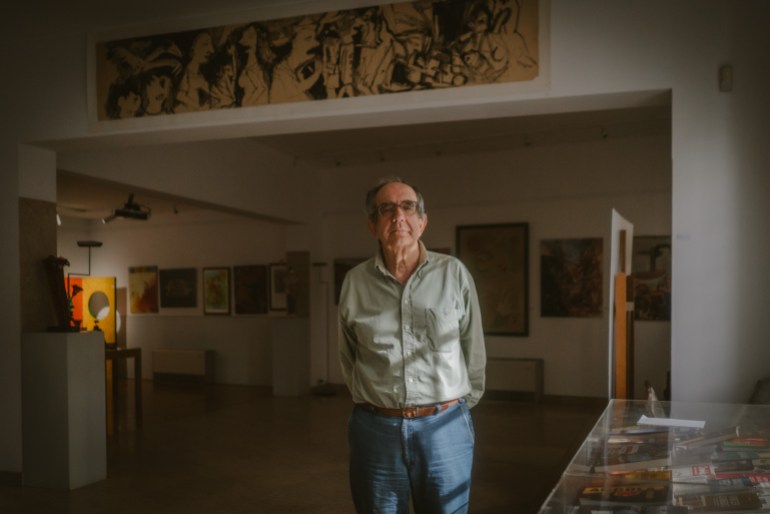
A revolution is born
On April 25, 1974, Portugal turned world information. Newspapers around the globe had been drenched in shiny pictures of celebrating Portuguese lots who took to the streets and positioned crimson carnations in soldier’s rifle barrels and uniforms. Portugal’s “Carnation Revolution” is commonly described as a near-bloodless army takeover. However a lot blood had been spilled within the years main as much as that second.
Within the early Sixties, as most African nations fought for and received independence from their European colonisers, Portugal stood agency in its declare to the nation’s African “possessions”. These had been now dubbed “Abroad Territory” as a substitute of “colonies” because of a 1951 rewrite of the structure and the nation had responded to self-determination claims with brutality and repression.
Dictator and Prime Minister Antonio de Oliveira Salazar had established the “Estado Novo” in 1932 – a corporatist state rooted in anti-liberalism and fascism fashioned within the wake of the demise of Portugal’s monarchy – and stored Portugal out of the second world battle. Regardless of being a brutal dictatorship, Salazar managed to guide Portugal into NATO’s anti-communist membership in 1949 because of its management of the Azores Islands, an important strategic outpost.
When the primary colonial battle had erupted in Angola in March 1961, quickly adopted by wars in Portuguese Guinea and Mozambique, Portugal was in a position to supply weaponry – helicopters, fighter plane and petrochemical weapons like napalm – from allied nations, primarily america, West Germany and France.
Moreover, throughout the Chilly Conflict, the Azorean army base turned an important strategic and geopolitical outpost within the mid-Atlantic, notably for america, whose continued entry to the army services trusted political and financial assist to Salazar’s authoritarian rule. The Azorean army services turned essential for america throughout its army operations to assist the Israel forces throughout the 1973 Arab-Israeli Conflict.
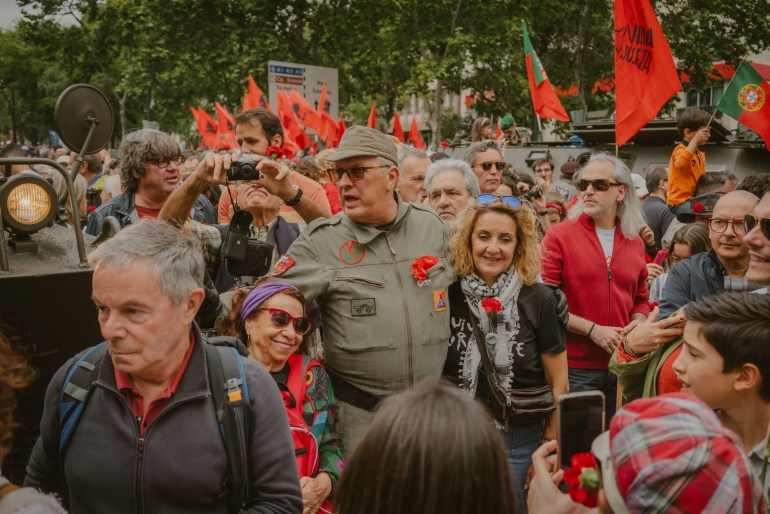
Lastly, within the mid-Sixties, the Portuguese dictatorship began to implode. The colonial wars had lastly introduced Portugal’s economic system to its knees, and enormous numbers of pressured army conscripts had been deserting – a lot to the embarrassment of the federal government – fleeing the nation and changing into vocal proponents of antiwar actions in international locations like France, West Germany and Sweden.
As a navy captain, Contreiras patrolled the Atlantic waters between Angola and Sao Tome. He remembers the primary indicators of dissent throughout the military. Inside an authoritarian political system, the very considered riot was unparalleled. Due to this fact, the primary whispers of change occurred in non-public exchanges.
“Conflict fatigue and a eager for democracy lastly caught up with us,” he says. “As a part of the navy, I skilled all battle fronts, and it was a dwelling hell.”
A revolutionary seed was planted, he believes, and it grew into one thing bigger – one thing irreversible. “The revolution was born out of the phrases we uttered at sea.”
Together with the seemingly unending colonial wars, the Portuguese army had began to ease the best way for extra speedy army rank development and promotions in 1973 by means of a sequence of recent legal guidelines to draw extra males to pursue army careers.
Low-ranking officers who remained on the decrease rungs of the profession ladder regardless of a few years of battle service noticed this as an existential risk. “We had been each pissed off and nervous concerning the improvement,” Contreiras remembers.
In the summertime of 1973, the “Naval Membership” had been initiated by the 200-odd army captains who had been decided to guard their army careers and refused to be singled out as scapegoats for Portugal’s declining successes in its colonial warfare. The preliminary programme referred to as for “Democracy, Improvement and Decolonisation” and to realize these targets, the clandestine motion realised the one method was by means of a army overthrow of the Estado Novo.
In September 1973, Chile’s socialist president, Salvador Allende, was overthrown by army leaders in a US-backed coup. The Naval Membership determined to repeat the Chilean coup makers’ use of secret indicators by way of public radio and satisfied a radio journalist, Alvaro Guerra, to hitch the plot. Guerra would subject the “sign” which might begin the army operation by enjoying a selected tune on his nightly programme, Limite (“Restrict”).
Contreiras secretly met Guerra “mere days earlier than the revolution” and handed him his final directions. The chosen tune – Grandola, Vila Morena by folks singer Jose Afonso – was to be performed shortly after midnight on April 25, 1974, signalling to the MFA to launch its takeover try. “It was effectively deliberate, all of it trusted timing,” he remembers.
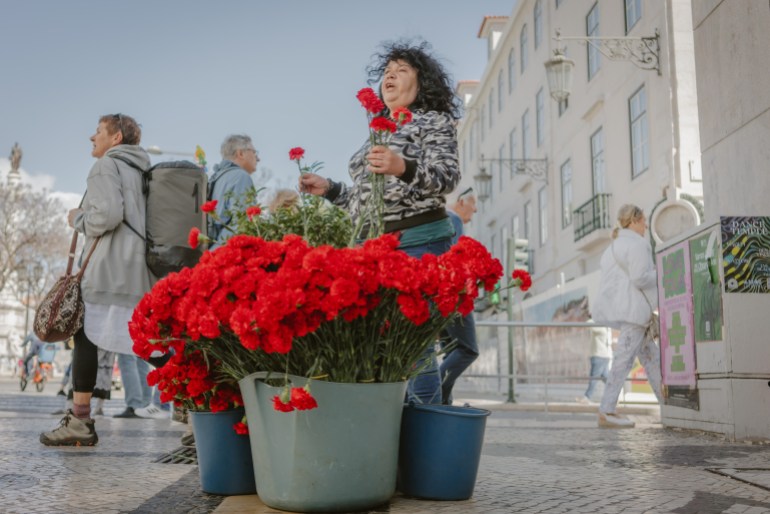
Return of the far-right?
Fifty years later, Afonso’s tune is enjoying at a restaurant on the Avenida da Liberdade as extra 1,000,000 folks take to the road to commemorate the “Carnation Revolution”.
The spectacular turnout of the aged, youth, dad and mom, and their toddlers underlines the significance of the dramatic political occasion – not simply for individuals who lived by means of it.
Claudia and Lucia, two academics of their 40s, break down and cry whereas consuming espresso at a restaurant earlier than the beginning of the commemoration march alongside Avenida da Liberdade all the way down to Rossio Sq..
They’re crying for his or her dad and mom who survived the dictatorship, explains Claudia.
“It’s so laborious for them to speak about what it was like throughout the Estado Novo,” provides Lucia. “Many Portuguese have simply put a lid over the previous, by no means to speak about it once more. For us, the kids of the revolution, it’s been laborious to take care of their ache, not to mention serving to them to maneuver on. That’s why the rise of the far-right in Portugal is such a tough blow – for us and for our dad and mom.”
The commemoration march – throughout which political leaders make speeches and cheer for the revolution whereas crowds of individuals drink beer and “ginja” (a Portuguese liqueur) – is framed by chants: “25 April, all the time! Fascism, by no means once more!”
Nonetheless, on this surroundings of seemingly overwhelming consensus, some have chosen to march in opposition to the human present, in opposition to the wave of quite a few folks. A middle-aged man, seemingly simply strolling by, shakes his head and curses the revolution. No one appears to note him, and his phrases are misplaced within the sea of revolutionary chants.
The person could also be one of many self-titled pacote silencioso (“silent pack”) of whom Portuguese students have been speaking for years, notably throughout the previous decade which has been a relentless repetition of monetary crises, government-imposed austerity insurance policies and rising poverty, resulting in an exhaustion of belief amongst some in democratic establishments and Portugal’s dominant events, the Socialist Occasion (PS) and the Social Democratic Occasion (PSD).

The indicators of dissent are right here to be seen. On a park bench, one other middle-aged man smokes a cigarette and glares on the passing wave of individuals. From a speaker, the hymn of the revolution is performed once more, to which the person screams: “Flip off that piece of shit! No one believes in that anyway!”
On the bench beside him lies a crimson carnation on prime of a duplicate of the sports activities paper A Bola. A lady snaps a photograph of the carnation and the newspaper, excusing herself, assuring the person she isn’t about to steal his flower. The person smiles and says: “Don’t fear, there aren’t any thieves right here. The one thieves are within the Portuguese parliament, stealing from the folks!”
It’s a sentiment that many seem to share. Chega clinched 50 seats in parliament in the identical 12 months that Portugal celebrated 50 years of liberal democracy. In response to an evaluation by social scientist Riccardo Marchi, Chega’s swift rise since its formation in 2019 by Andre Ventura, a former social democrat and tv character, is rooted in Portugal’s established “two-party system”, dominated by PS and PSD and which turned a longtime political mannequin after the autumn of Estado Novo in 1974.
Marchi writes: “The PS and PSD had been unable to reverse the rising dissatisfaction of enormous sectors of voters with the functioning of Portuguese democracy. This sense of democratic decline was attributed to the elite of the 2 dominant events and is evidenced, for instance, by the regular enhance in abstention.”
Chega’s electoral victory has been a minimum of partially attributed to the far-right occasion’s skill to steer previously reluctant voters to return to the voting sales space and to current itself as an interesting alternative for younger adults (primarily males between 18 and 25) with a deep-lying lack of belief in political establishments. For the primary time since 2009, voter turnout reached near 60 %, which in keeping with Marchi is a testomony to Chega’s skill to draw younger voters who’re “unaware of the nostalgia for the right-wing dictatorship, and dissatisfied however knowledgeable about politics, primarily by means of the tabloids and social networks”.
This pattern has overlapped with eroded historic narratives about Portuguese colonialism and the Salazar dictatorship. There may be lingering nostalgia amongst Chega voters for the “stability” and “order” that the Estado Novo provided its residents, students have stated. However the notion that the longer term is to be present in an authoritarian previous goes hand-in-hand with a renewed international populist motion of current years and Chega’s rewritten historic narrative, which incorporates downplaying the dictatorship’s international atrocities whereas outright celebrating it as a functioning state.
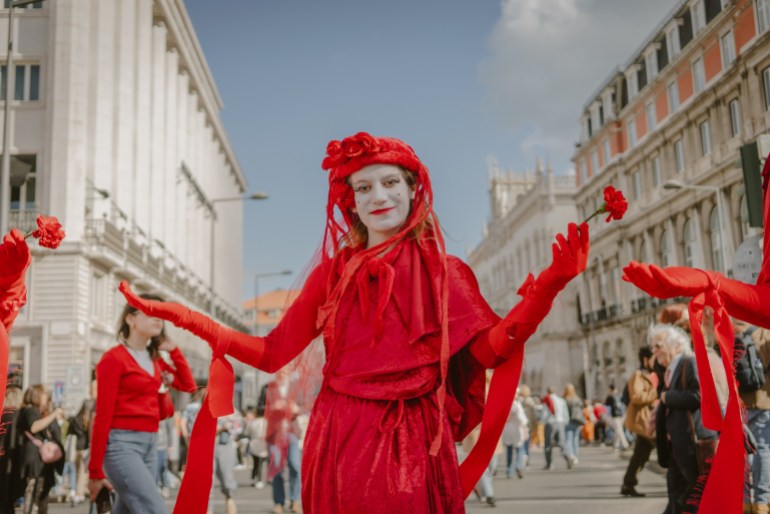
This narrative has even begun to cross the political aisle. In 2019, Lisbon’s socialist mayor, Fernando Medina, underlined Portugal’s historic international identification as “a place to begin for routes to find new worlds, new folks, new concepts”. Portraying Portugal as a constructive historic actor who “found new shores”, Medina turned a blind eye to the brutality and atrocities that went hand in hand with Portuguese colonialism.
Within the conservative press, Chega’s rise is portrayed as “a maturing wine” whereas the Carnation Revolution, in keeping with The European Conservative journal, opened the door to political instability, chaos and “left-wing hegemony”.
Framing its motion as a resurrection of Portuguese dignity and identification has been successful for the Portuguese far-right, in keeping with an evaluation by anthropologist Elsa Peralta: “In immediately’s total state of affairs of world disaster, former imperial myths and mentalities appear to have gained a second life, typically testifying to a grip on a nostalgic and biased model of the colonial previous,” she writes.
Chega has been in a position to journey this nostalgic wave, lifted by a European discourse rooted in xenophobia, specializing in immigration and populist options to advanced monetary and political dilemmas, observers have stated.
Uprooting the seeds of a revolution
Half a century in the past, Estado Novo’s main pillars of energy had been the police, army and the Catholic church – and educational circles. Each of Estado Novo’s dictators, Salazar and Caetano, had been well-educated economists who noticed Portugal’s universities as an extension of the conservative identification of the corporatist state.
At the moment, many Portuguese universities have change into ideological battlegrounds between Chega’s far-right coverage and local weather motion teams who’re taking a stand in opposition to fossil fuels-driven capitalism.
The day earlier than the fiftieth anniversary of the Carnation Revolution, Matilde Ventura and Jissica Silva from the scholar local weather disaster motion group Greve Climatica Estudantil (GCE), are smoking cigarettes in plastic chairs and having fun with the sunshine subsequent to protest tents pitched on the campus of Lisbon’s School of Social and Human Sciences for the previous month.
It is a group motion with numerous different motion teams at universities in Portugal and different European international locations, protesting in opposition to the nation’s dependency on fossil fuels.
In response to Ventura, a political science pupil, the local weather disaster has change into an ideal engine for Chega and the occasion’s far-right agenda which downplays the man-made environmental destruction of the Earth and questions local weather change as a hoax.
“One thing’s altering right here,” she says, squinting her eyes in opposition to the intense sunshine.
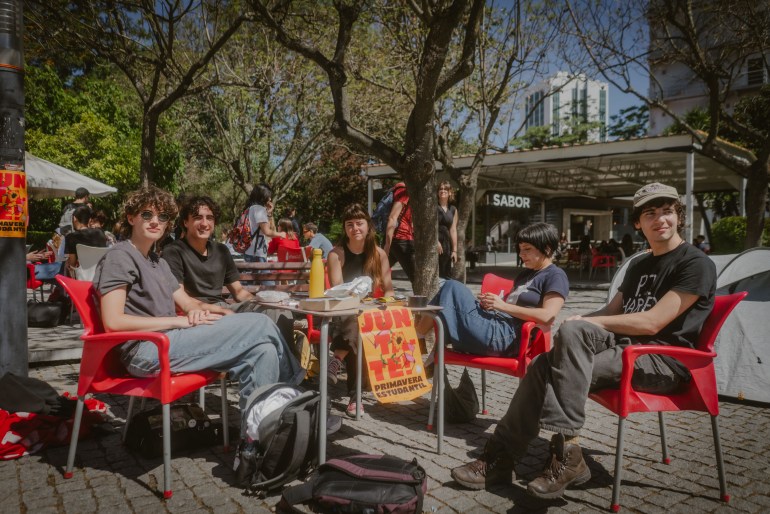
She remembers the early hours of Monday, November 13, 2023, when the local weather motion teams had determined to occupy the campus floor. That was when police stormed the campus and compelled the scholar occupants out of their tents the place they slept. They had been hauled to the police station and stored in custody in a single day. “It was the primary time for the reason that Salazar dictatorship that police crossed the edge right into a college,” she says. “It was a big and symbolic step. The police had been violent in opposition to us, and – don’t neglect – there are numerous Chega supporters among the many police. However we refused to be silent.”
The scholars returned to the school campus the following day, refused to go away, and continued to make their voices heard. The risk in opposition to democracy and the local weather go hand in hand, says Silva, a medical pupil. “The fossil fuels-driven capitalism is the context that embodies all points of the issue,” she provides. “All points – political, monetary, social and environmental – will be traced to the issue with local weather change and its roots in fossil fuels dependency.”
CGE’s campus occupation is critical for each Portugal’s far-right actions and the nation’s monetary oligarchy. Lisbon’s School of Social and Human Sciences was born from the Carnation Revolution, established in 1977 on a web site that had beforehand belonged to the army.
Now, the school is about to be eliminated and the previous army barracks it occupies is to be transformed right into a lodge advanced. The transferring date isn’t set, however the occupying college students of CGE see it as an emblem of political ebb – of uprooting certainly one of many seeds planted by the revolution.
“The circle is closed,” says Ventura. “It’s been 50 years for the reason that revolution, and the far-right is again. Not solely in parliament but additionally as a pressure in opposition to the democratic combat in opposition to the local weather disaster.”
Members of Chega had been there, on the campus, when Ventura and Silva and different college students returned from police custody, they are saying. Chega’s younger political star, 25-year-old former college pupil Rita Matias, entered the campus at hand out flyers and denounce the local weather disaster protests.
“Chega was protected by the police,” says Ventura. “However we managed to oust them from the campus and block the doorway by forming a human wall and chanted the identical motto as our dad and mom did after the revolution: ‘25 of April, all the time! Fascism, by no means once more!’”
The incident, she concludes, was a testomony to the perils of Portugal’s far-right momentum: “Portugal’s political and financial leaders don’t know how it’s to stay right here. In the event that they did, they wouldn’t waste one other minute by transferring ahead in the identical form and type as immediately.”
Silva talks of her grandfather, a battle veteran from the battlefield of Portuguese Guinea (now Guinea-Bissau and Cape Verde). “He typically talks about our shared accountability to make issues proper,” she says. “He returned to Africa after the revolution to work with a museum, to recollect the colonial wars and what actually occurred. That’s an inspiration for me.”

A misplaced revolution?
Throughout Lisbon, there are crimson carnations painted on murals, displayed on posters, seen in outlets and worn by folks. On an electrical energy pole shut by, somebody has shared a query on a poster for the fiftieth anniversary: “E depois?”(“After which what?”)
Portugal’s Carnation Revolution was “essentially the most profound to have taken place in Europe for the reason that Second World Conflict”, writes historian Raquel Varela in her guide concerning the revolution, A Individuals’s Historical past. Nevertheless it’s simpler to commemorate the dismantling of a fascist dictatorship and the decolonisation of African colonies than to method the demise of the revolution, because of the following counter-coup on November 25, 1975. As one outstanding worker at Lisbon College, who needs to stay nameless, places it, “We should not solely keep in mind 25 April 1974 but additionally handle the trauma of 25 November 1975.”
Varela concludes that the explanation the Portuguese coup in 1975 stays a fragile political matter is that it suffocated a social revolution that “was the final European revolution to name into query non-public property of the technique of manufacturing”.
Between April 1974 and November 1975, writes Varela, “a whole bunch of 1000’s of staff went on strike, a whole bunch of workplaces had been occupied generally for months and maybe virtually 3 million folks took half in demonstrations, occupations and commissions. An incredible many workplaces had been taken over and run by the employees. Land in a lot of southern and central Portugal was taken over by the employees themselves. Girls received, virtually in a single day, a number of concessions and made large strides in the direction of equal pay and equality.”
Portugal’s NATO allies, primarily america, feared that the previous fascist state would change into a socialist state. The White Home, led by President Gerald Ford and Secretary of State Henry Kissinger, acted by means of the US embassy in Lisbon, instructing the American ambassador Frank Carlucci – later secretary of protection – to “vaccinate” Portugal in opposition to the communist illness. America supported an anti-communist army part, the so-called “Group of 9” with each political capital and army tools, in addition to bullying Portugal throughout the NATO neighborhood.
When the “Group of 9” lastly deposed the revolutionary authorities in Lisbon on November 25, 1975, by dispatching 1,000 paratroopers, and clinched energy over the Portuguese authorities, the Carnation Revolution got here to an finish.
The historic aftermath has been dominated by a story primarily based on the notion that the Group of 9 normalised and stabilised Portuguese society by way of a “democratic counter-revolution”. America rewarded Portugal with an enormous financial enhance within the type of a “jumbo mortgage” to combine the Portuguese Armed Forces additional into NATO and liberalise the industries that had been “socialised” throughout the revolution.
Now, the tiny right-wing occasion, Centro Democratico e Social – Partido In style (CDS-PP), has moved to make November 25, 1975 an annual day of remembrance. The day, CDS-PP states in a submitted legislation proposal, “marked the trail in the direction of an irreversibly liberal democracy of the Western mannequin”. This proposal has the backing of Chega whereas PS, the Communist Occasion and the Left Bloc oppose it.
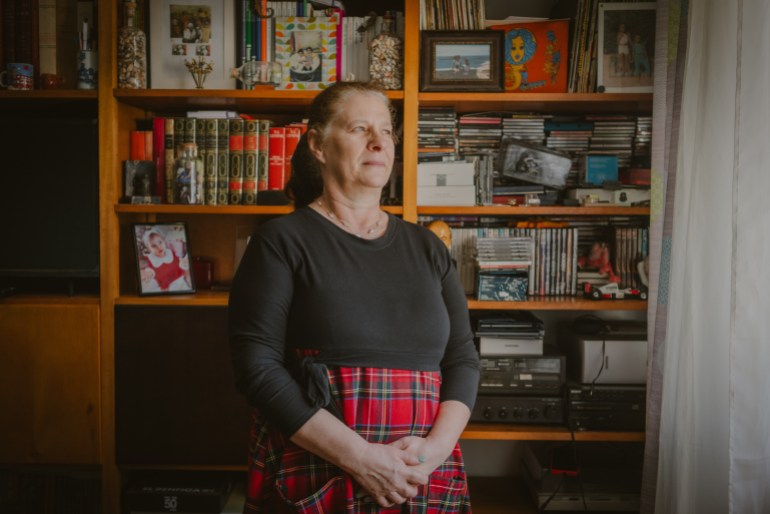
‘I’m a refugee, not a returnee’
One focus of consideration for far-right events in Portugal immediately is immigration. One-third of Portugal’s non-white immigrants stay in poverty.
In Rio de Mouro, a city of fifty,000 inhabitants located 23 kilometres (14 miles) from Lisbon, migrant staff from former Portuguese colonies arrive to sub-let over-priced flats and take low-paid jobs in development, the service sector or season-dependent industries.
Silvandira Costa, a 61-year-old assistant administrator and union activist at Editorial do Ministerio da Educação, a writer of studying supplies, factors to a row of condominium buildings a five-minute drive from the prepare station. “All these homes had been occupied by returnees after the revolution,” she says. “Individuals had no place to go, nowhere to sleep, so that they turned squatters.”
Costa can relate to their state of affairs. She was in her early teenagers in 1977 when her household “returned” to Portugal from Guinea-Bissau, the place she was born, within the wake of Guinean independence. “I’m a refugee,” Costa emphasises – she doesn’t see herself as a “returnee”. “I take into account myself African. I used to be born in Guinea, I had my first experiences of scent and style of meals and experiencing the soil and the solidarity among the many folks within the village the place I grew up.”
Refugee standing, nevertheless, was by no means granted to 500,000 – 800,000 Portuguese residents who arrived in Portugal within the mid-Seventies from the previous colonies. Portugal’s post-revolution governments and the United Nations Excessive Commissioner’s Workplace for Refugees (UNHCR) deemed them “residents of the nation of their vacation spot” and, subsequently, not eligible for refugee standing below the Conference of Refugees of 1951. For Silva, that underlined the sentiment of being a castaway in a brand new society, one to which she arrived with none possessions however the garments she was carrying. “If we weren’t refugees, then what had been we?” she asks out loud. “We left our dwelling in Guinea in a rush, boarded a airplane and anticipated to take care of the state of affairs in Portugal with none cash, nowhere to remain, no work for our mother and me and my sister had been seemed upon as aliens at college.”
Costa’s mom had left Portugal within the Fifties, as a part of an immigration programme below which Portuguese residents – typically poor households and concrete dwellers – had been promised land and a objective on the frontiers of the empire. The colonial battle in Portuguese Guinea modified all the pieces. Then the Carnation Revolution ended 500 years of Portuguese presence in Africa.
It was a burden to hold, to be the “bodily illustration of Portuguese colonialism and repression”, says Costa.

On the prepare station, she approaches a bunch of younger Guinean males who’ve gathered on the concrete steps near the prepare station. They communicate in Creole, about life, hardships, the state of affairs in Guinea-Bissau, and the longer term.
“The longer term?” says one man and laughs. “We speak about Africa – however the one future we’ve received is the world below our ft.”
“Portugal has an infinite accountability to take care of her colonial previous and atrocities in opposition to African folks,” says Costa. “Chega repeats the identical historic mistake because the fascists did by blaming poverty, inflated dwelling prices and social insecurity on immigrants. They’re afraid of the reality, and now they’re attempting to whitewash Portugal’s colonial historical past.”
A closed circle
Again in Lisbon, at Rua da Misericordia, on the second ground of the outdated army barracks that was overtaken by the MFA on April 25, 1974, former navy captain Carlos Almada Contreiras seems out over the identical road on which his life irrevocably modified – together with the lives of thousands and thousands of others in Portugal and its colonies.
Now, vacationers stroll out and in of eating places and shops. Autos drive up and down the identical cobblestone road that carried the olive-green army automobiles that early April morning 50 years in the past.
“A lot has modified, but the road stays the identical,” he virtually whispers.
Locked contained in the slender road, consistently sprayed by salty winds from the Atlantic Ocean, Europe’s final social revolution passed off. “It was a revolution for the approaching generations; it’s essential to inform the story in a method that runs alongside their on a regular basis life, to make them realise what was at stake again in 1974.”
How did it really feel to be a part of the collapse of a colonial empire? Contreiras laughs, ponders the query, after which solutions: “I’ve by no means actually considered it. However certain, that’s what we achieved in the long run.”